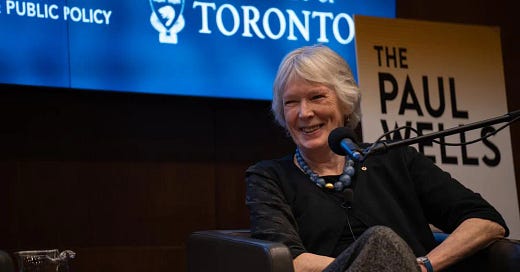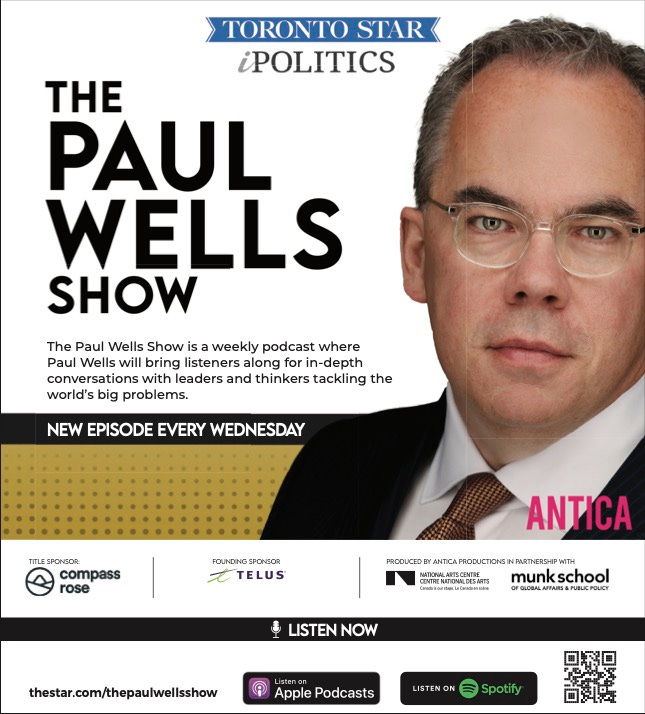Margaret MacMillan's world
On the podcast, a whirlwind world tour with the great historian.
The last of four interviews we recorded for The Paul Wells Show last week at the University of Toronto’s Munk School was with Margaret MacMillan. Of course we got a great crowd out. Everyone knows she’s a fascinating speaker.
The author of Paris 1919 has had a busy year. She’s working on a book, of course, about Roosevelt, Churchill and Stalin in World War II. Last autumn she got a call from Buckingham Palace and learned she was being inducted into the Order of Merit, which can have only 24 members at a time from across the Commonwealth. Jean Chrétien is the other current Canadian member. She had a lovely visit with the King. Of course I asked her how that whole process went, and as you’ll hear, she gives great detail: part of her skill as a historian is an eye for social interaction.
We had a lot to discuss. Putin’s invasion of Ukraine, Ukraine’s amazing resilience, Britain’s difficult Brexit, China’s changing role, Canada’s place in all of the above. It was a rapid-fire exchange, because as I’ve learned in past interviews, she doesn’t waste a lot of words so I had to have backup questions ready. But it works out well, because we covered a tremendous range of current events and their historical context. I’m really happy with the resulting podcast. Here it is on Apple Podcasts:
And here’s how to find it on other platforms.
With the Bill Morneau interview last week, Margaret MacMillan this week, and upcoming interviews with Toronto International Film Festival CEO Cameron Bailey; federal Crown-Indigenous Relations Minister Marc Miller; and Andy Byford, the guy who’s run more big-city transit systems than anyone, I think we’ve got a good thing going with this podcast. Make sure you smash that subscribe button, on whichever platform you prefer, and tell some friends.
The Founding Sponsor of The Paul Wells Show is Telus. Our Title Sponsor is Compass Rose. Our Ottawa partner is the National Arts Centre. In Toronto, I’m the inaugural Journalist Fellow-in-Residence at the University of Toronto’s Munk School of Global Affairs and Public Policy. Antica Productions handles production for the podcast. The Toronto Star and iPolitics distribute and promote The Paul Wells Show. Kevin Breit recorded and performed the music, although soon we’ll have a few surprises on that front. Thanks for listening.
World of opioid ambivalence
As a bonus for you today, some fresh polling on attitudes toward supervised injection sites. I was as surprised as anyone when Pierre Poilievre’s comments on opioid policy became a hot political topic a couple of months ago. Now there’s heightened interest in just about every aspect of the file.
For instance, there was a lot of attention this week when British Columbia announced that, in cooperation with the federal government, it will launch a three-year pilot program in drug decriminalization. This news sure caught my attention, because I remember Andrew Scheer saying in 2019 that the Liberals were contemplating such things, and reporters telling me his claim was false.
Things are moving so fast on this file that asking about supervised-consumption sites might almost seem quaint, but they’re still an important front-line component of most harm reduction programs in most provinces. (When I was in Winnipeg I was amazed to learn they don’t have such facilities yet. Amazed and concerned.)
Dan Arnold, Chief Strategy Officer at Pollara Strategic Insights, told me about their latest large-sample poll. Dan was the Trudeau Liberals’ chief pollster until a year ago, but I knew him before that and I was glad to hear from him. Here’s the data.
Sixty-two per cent of respondents agree safe injection sites save lives. Indeed almost as many, 59%, say they get people needed treatment. The number who say injection sites lead to more drug use is lower, though still considerable, at 41%, while 33% say they lead to more crime.
Across Canada, more respondents supported government funding of safe injection sites than opposed it. But here’s the plot twist: in most of the country, support for a safe injection site in your community is markedly lower than support for the policy in the abstract. And in fact, phrased that way, it’s a net loser in public opinion from Ontario on west.
Splits by party preference are kind of what you’d expect: Conservative supporters are markedly less supportive of safe-injection sites than Liberal and NDP supporters. Pollara’s Arnold told me that with opinions splitting this way — the issue really isn’t a slam dunk for any position in any party — all parties would probably rather campaign on something else, when the time to campaign comes.
Here’s the methodology slide. Full details of the poll are here.











I enjoy listening to and watching Margaret when she does interviews. However I was surprised and disappointed to hear her believe that climate change is an existential threat. I realize I may get lots of flack for my views. But I support the approach Bjorn Lomborg and others who not only say we are not facing extinction, but the answer to climate change is to start putting more money into creating technologies that will reduce our dependence on fossil fuels over time - over the next 100 years. In his opinion and mine there's far too much screaming about 'something must be done' without the actual doing. And so far wind and solar and the dream of having endless batteries for storing excess energy and having electric vehicle charging stations everywhere including in places of extreme weather conditions just are far from the best solutions.
I loved this interview. It's so much nicer to hear the hard truths from someone with enough altitude to explain things without the hyperbole. Thank you for introducing me to Mrs. MacMillan.